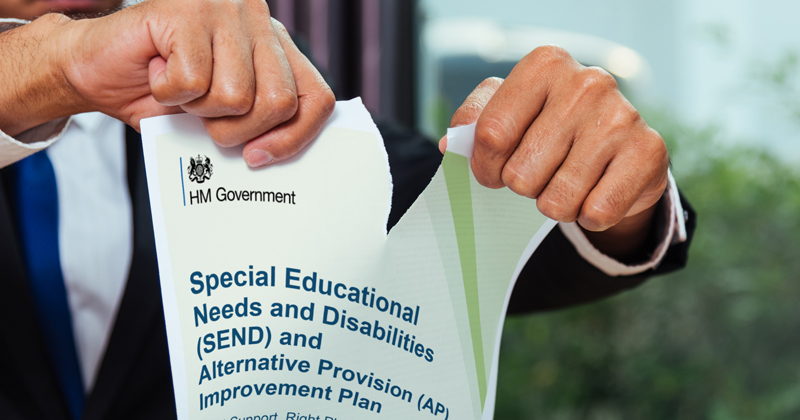The Conservative government’s SEND improvement plan “did not go far enough” to resolve the major issues in the special needs system, the new government has said.
In a 17,000-word response to the education committee’s SEND inquiry, Department for Education officials tore through the reforms – which were three years in the making.
They said they did not look hard enough” at wider barriers and “perverse” incentives to more inclusive schools.
Their submission gives a further insight into the government’s thinking on where its own special needs reforms – due to be outlined this year – will end up.
It also reveals concerns that special needs provision will not be protected as more councils predict bankruptcies and pupils in overcrowded special schools get worse GCSE results.
Plan ‘did not go far enough’
The previous government’s SEND improvement plan – which took three years to draw up and cost £70 million to test – “did not go far enough”, Labour has said.
The plan was billed as setting out “systemic reforms” that would ensure “every child gets the help they need”.
But Labour’s submission to MPs picks apart many aspects of the plan, concluding: “Overall, it did not take a fundamental look at the underpinnings of the system that had caused the challenges in the first place, but sought to address the problems within that system.”
‘Didn’t look hard enough at inclusion barriers’
The plan “did not commit clearly enough to an inclusive mainstream system, or look hard enough at wider barriers”.
There were “mixed messages” about driving inclusion while creating “very large numbers” of new special school places.
Schools also believed the reforms “continued to rely on a model that looked only at individual needs, and made it hard to provide support for cohorts or groups of children – which they believed could be done more efficiently and effectively”, officials said.
Meanwhile, the plan “did not address perverse incentives in things like the accountability framework that could discourage inclusion”.
Councils told the government the plan asked them to “take responsibility” for a “much better and more consistent offer” for pupils with additional needs “without the levers to deliver it”.
And parents “worried” reforms “implied a reduction in the guaranteed support offered by EHCPs without enough clarity on what would be offered instead”.
£1bn safety-valve bailouts ‘not effective enough’…
Another key intervention was the safety-valve scheme. Councils with huge deficits on their SEND budgets were promised multi-year bailouts totalling £1 billion – in return for strict cost-saving measures.
But Labour has stopped new entrants to the scheme. Five agreements are also suspended, likely because councils have fallen behind on cuts.
The government said the scheme has “not been effective enough across the board given the scale of the challenge”.
A lessons-learned report is due to be published this month.
…concern over SEND hit from council bankruptcy
Provision for special needs funding mostly comes from the dedicated and ring-fenced schools grant, which would not be directly impacted should a council issue a section 114 notice (which means it is effectively bankrupt).
But the government said councils “may have to reduce spend on any discretionary elements, like early intervention and preventative services” from non-ring-fenced budgets.
Such savings could “also adversely affect wider support functions such as workforce and home-to-school transport, putting the quality and/or effectiveness of SEND provision at risk, as well as wider impacts beyond education and high-needs”.
Six top-tier councils have issued section 114 notices since 2020. They are not named, but in November 2021 Slough was found to have “significant concerns” over its SEND provision, a year after it issued a section 114.
Officials said they would provide support to “help mitigate” drops in provision in such cases.
But the outlook is bleak, with half of councils warning they are likely to issue a section 114 notice in the next five years, a poll for the Local Government Information Unit last year found.
‘Will build on’ £70m Change programme
The improvement plan included £70 million to trial reforms under the Change programme.
This included proposals for standardised EHCP templates, strengthened mediation, and multi-agency panels for plans. But while criticising the reforms, officials are still “considering how we can build on this”.
The scheme was also helping officials “spot and address unintended consequences created by how the reforms interact together. Evidence will inform any future decision to legislate to require the whole system to deliver these changes.”
Lower GCSEs in ‘overcrowded’ schools’
The submission outlined “some evidence that pupils in overcrowded settings – special or mainstream – typically have lower attainment”, estimated as the equivalent of a two-percentage point reduction.
However, the government said it has not tested this against current special school attainment and capacity data.
Nearly two thirds of special schools are at or over capacity. Overcrowded schools have about 12 per cent more pupils than reported capacity.
The DfE did not respond to a request for comment.
One in 14 schools has a SEND unit
To increase capacity, the government is encouraging mainstream schools and councils to set up resourced provision and SEN units.
However, data shows just one in 14 schools nationally has one. There is also a big variability: one in seven secondaries has such provision, compared with one in 14 primaries.
The government also said some councils have no schools with SEN units, while other areas have one in every four schools.
But officials said they are keen to “scale up” best practice and “work with the sector to extend this across the system, including how SEN units and resourced provision can promote greater inclusion”.
‘No quick fixes’ and ‘more money not always the answer’…
Officials said it was time for “bold reform”, with a white paper due this year. The government will focus on making mainstream schools more inclusive and early identification of SEND.
But there are “no quick fixes”, with officials taking “a considered approach to deliver sustainable system reform”.
The high-needs budget – which funds provision for pupils with additional needs – has risen £4 billion (up 60 per cent) from 2019 to 2024, but has still not kept pace with rising demand.

Councils have an estimated £3.3 billion deficit in their high-needs budgets, which is expected to keep rising.
But the government’s submission said “more money is not always the answer (or an option)” given the “current fiscal challenges”.
“What matters is how the money is spent, and what behaviours we are incentivising… In a steady state system, we should focus much more on how money is better spent to support an inclusive mainstream educational system, which meets children’s needs and means that parents will no longer have to resort to highly individualised plans to support their children’s needs.”
…but (a reminder) of just how bad things are
The submission highlights how broken the SEND system is
The number of EHCP pupils in private SEND schools – which cost on average £62,000 per place compared with £24,000 in maintained special schools – has more than trebled to 15,620 since 2010.
The government admits this may be “indicative” of a mainstream system that is “decreasingly able” to meet the need” of SEND pupils, with the statutory EHCP process becoming “increasingly used to secure resources to meet need”.
Nearly 5 per cent of pupils now have an EHCP/or an old “statement”, up from 2.8 per cent in 2010.
But this varies hugely from 2.1 per cent in some councils last year, to 7.1 per cent in others.
Meanwhile in Essex, just 1 per cent of EHCPs were issued within the 20-week legal limit, compared with 100 per cent in Wandsworth, south London.
Better SEND ‘system health’ indicators planned
Given the outlook, the government wants to improve its data around SEND and alternative provision.
It will “take stock of our system health indicators, data flows as well as the regular data and insights needed as we embark on a programme of reform. We will make this an integral part of programme governance going forward.”
The DfE did not provide more details.
Surge in kids in unregistered settings
There has been a rise of nearly a third in the number of children in unregistered AP in one year, up to 27,060 from 20,390 in 2022-23.
A Schools Week investigation in 2023 revealed children as young as five were increasingly sent to unregulated institutions, where teachers had neither qualifications nor criminal record checks.
In its submission, the government said it wants AP to stop focusing “exclusively on expensive long-term placements” and focus instead on three tiers: targeted support for mainstream, time-limited placements for those in need of “more intensive support’” and transitional placements for those reintegrating back into mainstream.
APs providing expertise to mainstream schools would also help “reduce numbers of preventable exclusions”.








Your thoughts